- Bernard Preston homepage
- Lignans
- Lignans Protect the Prostate Gland
Lignans protect the prostate gland
Lignans protect the prostate gland from malicious tumors and the consequent impotence that every man dreads.
Prostate gland cancer is the most common serious malignant tumour of men; one in eight currently will suffer from it. The Lancet Commission predicts the number will double in the next twenty years.
The reasons are complex; part of it is simply that we are living longer. Whilst young men can and do get prostate cancer it is primarily a disease of the elderly.
What we eat has a profound role to play in the prevention of the disease. Rates of prostate cancer soar when Asians move to Europe and America; clearly lifestyle is involved.
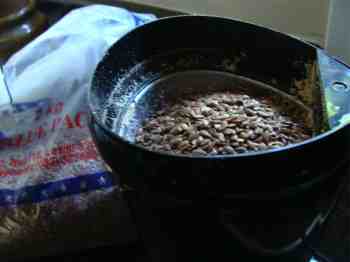 Flaxseeds are the richest foods in lignans
Flaxseeds are the richest foods in lignansPrevention is better than a cure
The Lancet Commission report[2] should be read and digested by every man; they are "planning for the surge in cases." Yet it is depressing in that it is all about screening and treatment; to stop the already shocking rates from doubling.
The time-tested adage of prevention being better than a cure it would seem is largely ignored.
What is known is that the progress of prostate cancer is highly variable; many men die with it rather than from the disease. In others it proliferates rapidly and may kill within months.
Aptosis is the term given to the normal death of all cells. Malignant tumours have developed mechanisms that evade this process; they proliferate and spread.
Researchers have found that lignans increase this process of aptosis in prostate cancer cells; they are less likely to proliferate and metastasize.
Intestinal bacteria
The mechanism whereby these lignans are thought to function is by the action of intestinal bacteria that produce compounds like enterolactone; these are absorbed into the blood stream and can reach tumour cells throughout the body.
The process is entirely dependent on a normal, diverse array of intestinal bacteria[4]. Yet it is known that the microbiome has been extremely negatively affected by the chemicals added to typical grocery store food; and the proliferation of antibiotics, both prescribed and in animal foods.
Asian people typically eat fermented foods like kimchi and natto; they are rich in the friendly flora that support both the numbers and diversity of the bacteria in the gut. When emigrating to the West they are less likely to consume these foods.
Homemade hummus without all the added preservatives and flavour enhancers is particularly rich in lignans.
Lignans protect the prostate gland.
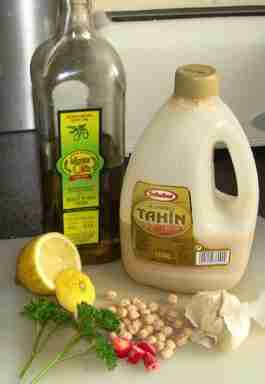 Hummus is rich in lignans
Hummus is rich in lignansNumerous studies show that lignans alone in the diet do not correlate with protection from prostate cancer; particularly at low levels eaten sporadically. It would appear that a healthy microbiome is also required.
This kefir smoothie[3] may provide the answer. The probiotic supplemented with a mixture of diverse nuts and seeds, rich in lignans is a particularly pleasant breakfast; easy and quick to prepare, it provides satiety.
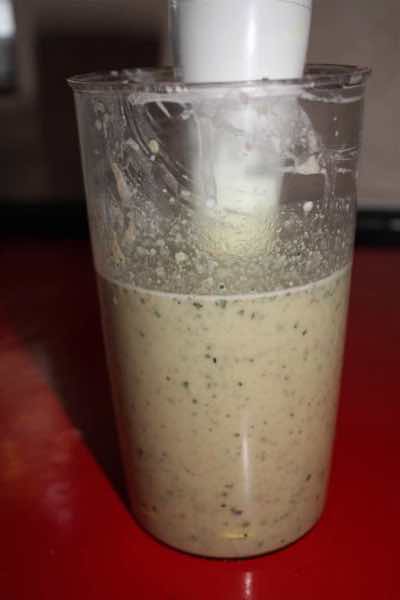 Kefir breakfast smoothie
Kefir breakfast smoothieWhole grains
True whole grains have become very difficult to purchase; millers typically extract the bran where the lignans are located. The exceptions are corn on the cob and unpolished rice.
To obtain the full complement of lignans in wheat, corn and rye one must have access to a mill that does not separate the three streams; the bran, germ and endosperm. Because of the oils, the flour must be freshly-ground; it has a shelf life.
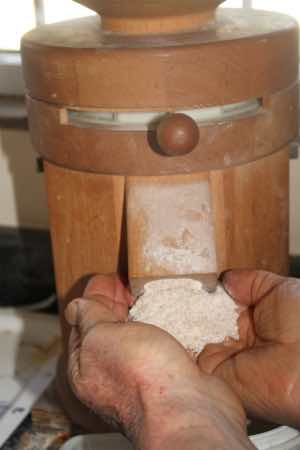 No separation of bran, germ and endosperm
No separation of bran, germ and endospermGrinding the flour and mixing takes no more than five minutes; better still is the addition of a sourdough starter. Whilst no live bacteria would reach the intestine after baking, their metabolites certain pass on to the gut.
Lignans protect the prostate gland; what about other organs?
Stone-ground grits
Likewise true unrefined grits is almost impossible to find. It too has a shelf life so millers extract the oils together with the lignan-containing bran; they go to feed the pigs.
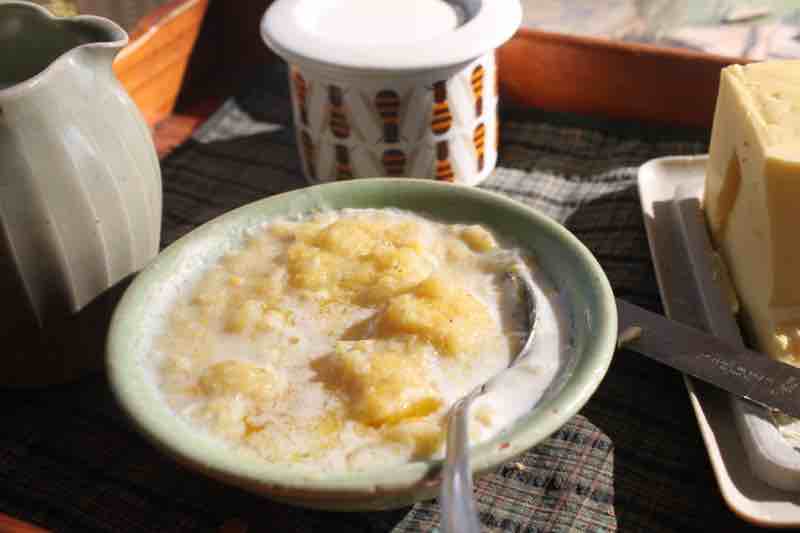
Once again access to a mill that does not separate the three streams is the only way to obtain true wholegrain cornmeal; and the lignans that protect the prostate gland.
Large amounts of lignans
What appears to be clear is that small amounts of lignans may not help to reduce the prevalence of prostate cancer; yes, they may help the aggressiveness of the tumour.
Researchers are recommending large scale supplementation, far more than the average person on typical grocery store food would eat.
Breakfast like a king
A solid breakfast rich in a probiotic, whole grains and freshly-ground seeds makes a solid start to the day providing ample lignans to protect the prostate gland.
The resistant starch and fibre slow gastric emptying; they reduce the glycemic surge from the sugars in the carb. They also provide satiety so there is no urge to eat at 11 o'clock; it deals with the hunger pangs that haunt those calorie-counting.
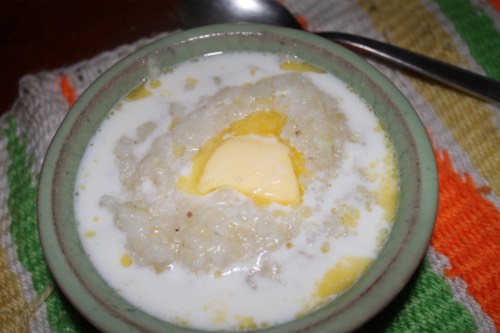 Wholegrain corn porridge
Wholegrain corn porridgeUnseen is the tomato in Eggs Hilton; the lycopene gives added prostate protection. Added fat from olive oil increases the absorption of the phytonutrients.
Scientists have established that it is these lycopenes in tomatoes that give Italian men such protection from prostate cancer[5].
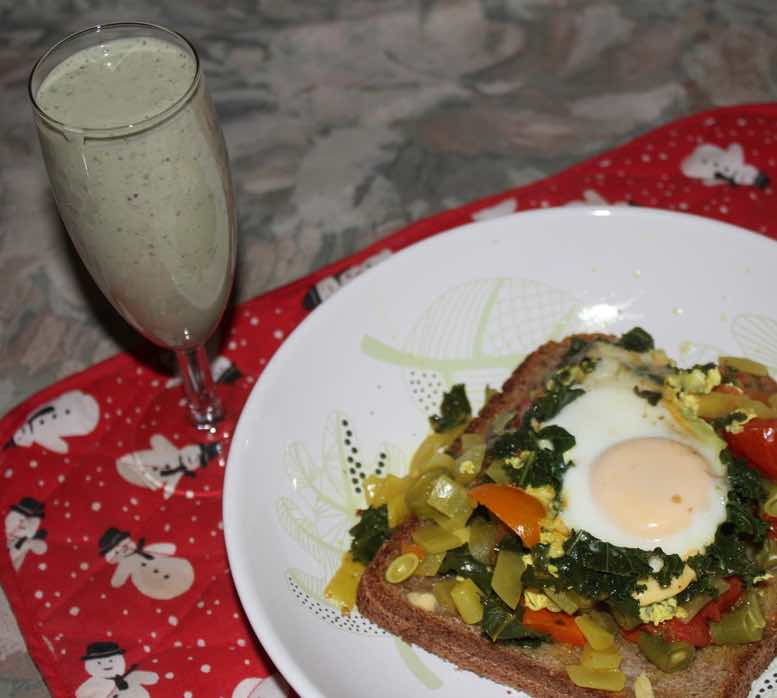 Kefir smoothie, wholegrain toast and dark-green leafy veggies
Kefir smoothie, wholegrain toast and dark-green leafy veggies"In this cohort study of 2062 men with a prostate neoplasm, highest vs lowest quintile intake of plant foods after diagnosis was associated with a 47% lower risk of cancer progression."
- JAMA Open Network
Lunch like a prince
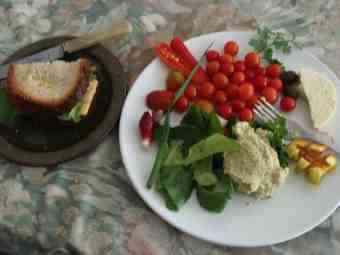 Hummus and wholegrain bread
Hummus and wholegrain breadThe chickpeas and sesame paste in hummus are both rich sources of lignans; as is true wholegrain bread.
Dine like a pauper
The golden rule in the Blue Zones where longevity is so prevalent is to leave the table slightly hungary. That is particularly true at supper; a small meal is the best management of indigestion and heartburn.
This photo was taken some years ago before I learned that one slice of real bread is enough. All that fibre means that two will take a long time to digest properly.
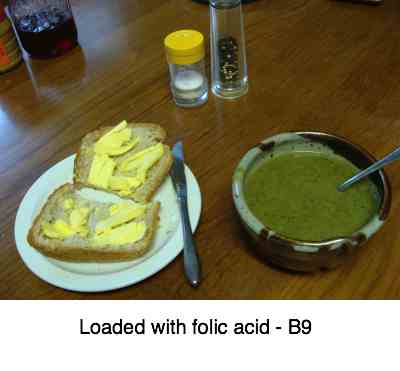 Broccoli and avocado soup; with wholegrain bread.
Broccoli and avocado soup; with wholegrain bread.Broccoli and avocado are both rich in lignans.
Lignans help protect the prostate gland
Lignans protect the prostate gland by providing a rich source of differing foods enabling the friendly flora in the colon to synthesise enterolactone.
We either make time to prepare foods that protect our wellness or spend a lot more consulting doctors and pharmacists; take your pick.
As for me and my family we choose to enjoy lignan-rich food. My last PSA was 0.9; off the scale.
Is flax-seed good or bad for prostate cancer?
I do hope you can now answer this question authoritatively, based on the research. The lignans in flax seeds are indeed good protection against prostate cancer; and a whole lot of other conditions. They will also mean a lot less stressing and straining on the loo; that too is a blessing not to be underestimated.
- Flaxseed-Derived Enterolactone Is Inversely Associated with Tumor Cell Proliferation in Men with Localized Prostate Cancer
- The Lancet Commission on prostate cancer: planning for the surge in cases
- Kefir breakfast smoothie
- Dietary lignans, plasma enterolactone levels, and metabolic risk in men: exploring the role of the gut microbiome
- Tomato and prostate cancer research
When browsing use right click and "Open Link in New Tab" or you may get a bad gateway signal.
User-friendly and helpful?
Did you find this page user-friendly and helpful? Please share it with your male friends; don't spam, just those whom you think might benefit.
Newsletter
Our newsletter is entitled "create a cyan zone" at your home, preserving both yourself and Mother Earth for future generations; and the family too, of course. We promise not to spam you with daily emails promoting various products. You may get an occasional nudge to buy one of my books.
Here are the back issues.
- Lifestyle and ideal body weight
- What are ultra-processed foods?
- Investing in long-term health
- Diseases from plastic exposure
- Intensive lifestyle management for obesity has limited value
- A world largely devoid of Parkinson's Disease
- The impact of friendly bacteria in the tum on the prevention of cancer
- There's a hole in the bucket
- Everyone is talking about weight loss drugs
- Pull the sweet tooth
- If you suffer from heartburn plant a susu
- Refined maize meal and stunting
- Should agriculture and industry get priority for water and electricity?
- Nature is calling
- Mill your own flour
- Bake your own sourdough bread
- Microplastics from our water
- Alternative types of water storage
- Wear your clothes out
- Comfort foods
- Create a bee-friendly environment
- Go to bed slightly hungry
- Keep bees
- Blue zone folk are religious
- Reduce plastic waste
- Family is important
- What can go in compost?
- Grow broad beans for longevity
- Harvest and store sunshine
- Blue zone exercise
- Harvest and store your rainwater
- Create a cyan zone at your home
Did you find this page interesting? How about forwarding it to a friendly book or food junkie? Better still, a social media tick would help.
- Bernard Preston homepage
- Lignans
- Lignans Protect the Prostate Gland
Address:
56 Groenekloof Rd,
Hilton, KZN
South Africa
Website:
https://www.bernard-preston.com